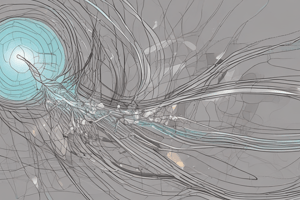Podcast
Questions and Answers
What is the sequence of events during an action potential in a neuron?
What is the sequence of events during an action potential in a neuron?
- First gate opens, charge is reversed; second gate opens, charge is reversed; first gate remains open, charge stays reversed
- First gate opens, charge is reversed; second gate opens, charge is reversed; first gate closes, charge stays reversed
- First gate opens, charge is reversed; second gate opens, charge is reversed; first gate closes, charge returns to rest (correct)
- First gate opens, charge is reversed; second gate remains closed, charge returns to rest
Why does a neuron fire if the stimulus is just strong enough to pass its threshold?
Why does a neuron fire if the stimulus is just strong enough to pass its threshold?
- It opens all the gates in the neuron
- It causes the neuron to add together 'fire' messages and 'don't fire' messages (correct)
- It reverses the electrical charge in the neuron
- It prevents the neuron from firing
How does a neuron fire according to the 'all or none' policy?
How does a neuron fire according to the 'all or none' policy?
- It fires gradually, increasing in strength
- It fires partially at varying strengths
- It fires randomly at different strengths
- It either fires at full strength or not at all (correct)
What happens when a neuron fires in an 'all or none' fashion?
What happens when a neuron fires in an 'all or none' fashion?
What role do 'fire' messages and 'don't fire' messages play in a neuron's firing decision?
What role do 'fire' messages and 'don't fire' messages play in a neuron's firing decision?
How does a neuron determine whether it will fire or not based on incoming signals?
How does a neuron determine whether it will fire or not based on incoming signals?
In what way does a neuron behave similarly to turning on a light switch?
In what way does a neuron behave similarly to turning on a light switch?
What happens to the electrical charge in a neuron after the first gate opens and closes?
What happens to the electrical charge in a neuron after the first gate opens and closes?
What determines whether a neuron will cross its firing threshold?
What determines whether a neuron will cross its firing threshold?
How does a neuron determine whether a signal is strong enough to make it fire?
How does a neuron determine whether a signal is strong enough to make it fire?
Flashcards are hidden until you start studying
Study Notes
Neuron Stimulation
- When a cell is stimulated, the first gate opens, and the electrical charge is reversed.
- The next gate opens, and the charge is reversed, but the first gate closes, and the charge returns to its resting state.
Action Potential
- The action potential is the sequence of gates opening along the length of the cell.
Graded Potential
- Neurons have a threshold for firing, which requires a stimulus strong enough to pass it.
- The neuron receives many signals from other neurons, some of which cause the neuron to fire (excitatory) and others that prevent it from firing (inhibitory).
- The neuron constantly adds the excitatory signals and subtracts the inhibitory signals.
- If the excitatory signals are strong enough, the threshold is crossed, and the neuron fires.
All or None Policy
- When a neuron fires, it fires in an all or none fashion, with no partial firing.
- Neurons are either firing at full strength or not firing at all.
- This is similar to a light switch, which is either on or off, with no intermediate state.
Studying That Suits You
Use AI to generate personalized quizzes and flashcards to suit your learning preferences.




